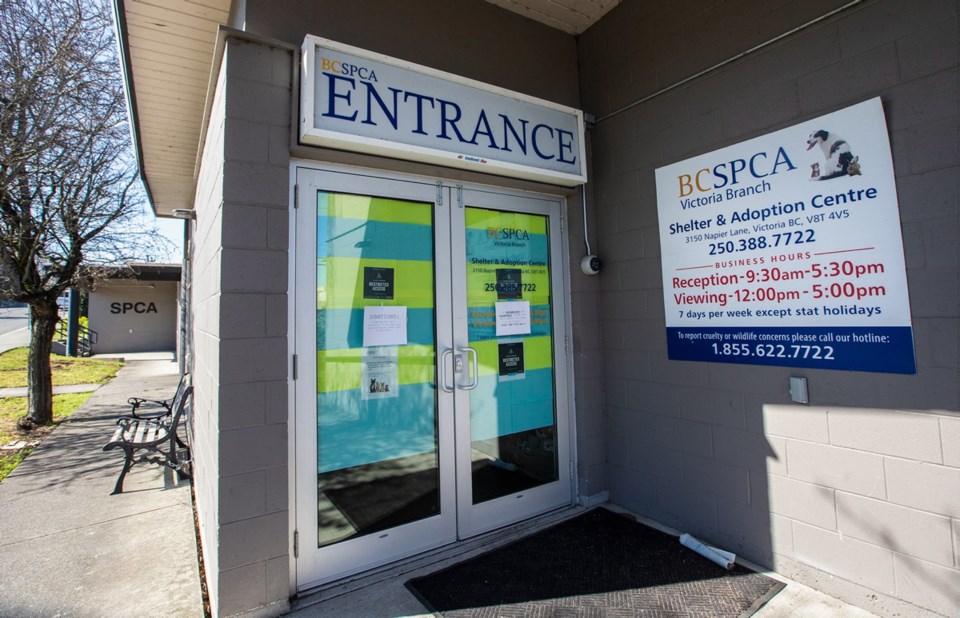The B.C. SPCA is significantly restricting public access to its shelters to protect its staff, volunteers and members of the public during the COVID-19 pandemic.
“We’re maintaining our services for the animals and we have our staff and essential-service volunteers making sure the animals are coming in,” Lorie Chortyk, general manager of community relations for the B.C. SPCA, said Friday. “But we are limiting the number of people in shelters at any time. We’re only open for adoption by appointment and for emergency surrenders.”
The SPCA has 550 staff and more than 5,000 people volunteering at 36 shelters throughout the province, including seven shelters on Vancouver Island.
It will continue to care for the 550 animals awaiting adoption throughout the province. It will also provide emergency treatment for animals that come into custody through animal-cruelty investigations, said Chortyk.
Right now, however, the organization is asking people who want to surrender their animals to continue to look after them unless it is an emergency, said Chortyk. “Because we don’t have the capacity right now.”
On Thursday, the SPCA found homes for 100 animals through adoption and fostering, to clear space for new animals. And this week, March 23 to 27, adoption fees will be cut in half.
“Basically, we do want people to keep adopting animals because unless we are able to move animals into new, loving homes, we’re not going to have the space to keep taking in new animals,” said Chortyk.
People interested in adopting can see the available animals online, where they can fill out an application. Staff will contact potential adopters with more information, and set up an appointment to see the animal.
“If people are home now, it might be a good time to introduce a new pet into their lives,” said Chortyk, cautioning there will be disruptions with limited staffing.
“Some people are working from home, but in the shelters, they are going to be dealing with staff shortages. There’s no doubt about that. We’re trying to plan for that.”
The SPCA will also continue its compassionate boarding program, which keeps an animal safe if its owner is leaving a violent situation. “We suspect we’ll see a rise in those situations, because we know tough times sometimes exacerbate intense situations,” said Chortyk.
The SPCA has cancelled its fundraising events and spring-break camps for children, and is working on developing ways to provide online programs for kids, said Chortyk.
At the Victoria Humane Society, executive director Penny Stone said Friday that the economic impact of the pandemic is affecting people and their pets.
“People are getting laid off or they’re worried they’ll lose their house or apartment and we’re getting all these phone calls: ‘I can’t keep my dog.’ ‘I can’t keep my cat.’ ‘I’m going to lose my house.’ There’s quite a panic.”
The humane society, which does not have a facility, is trying desperately to bring animals from the Interior and the Prairie provinces to Victoria, “because once the planes stop flying, they’ll die. There’s just nowhere for them to go to,” said Stone.
More than 20 animals are expected to be flown to the Island today.
The upside, however, is an increase in the number of people offering to foster animals because they are home, said Stone. “And we love that.”
She’s asking people to go to the website and fill out a foster form.
“That will be very helpful for us and enable us to say ‘yes’ — yes we can take those puppies, yes we can take that pregnant mom, yes we can take that injured dog.”
As with the B.C. SPCA, fundraisers for the humane society have been delayed and donations have dried up. Yet Stone said the society is getting two to three calls a day from people who can no longer take care of their animals.
It will take an animal if the person has nowhere to live or if the animal is at risk, she said. “The ones that are going to die today, we have to get those in first.”
Three pregnant animals are set to arrive this weekend, said Stone, noting that kitten and puppy season has begun.
“We’re hitting this at the worst possible time. But the reality is we have to take them. We want to say yes every single time and we try. But we do have to prioritize and take the ones who are at risk first.”
The society helps animals, but Stone said it also helps people.
“This is really hard for people who are looking at giving up their animals because there is nowhere for them to go,” she said.
“We know how this is affecting people.”



